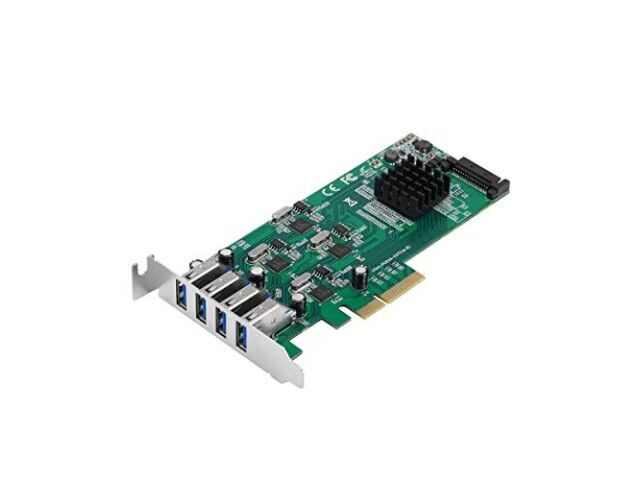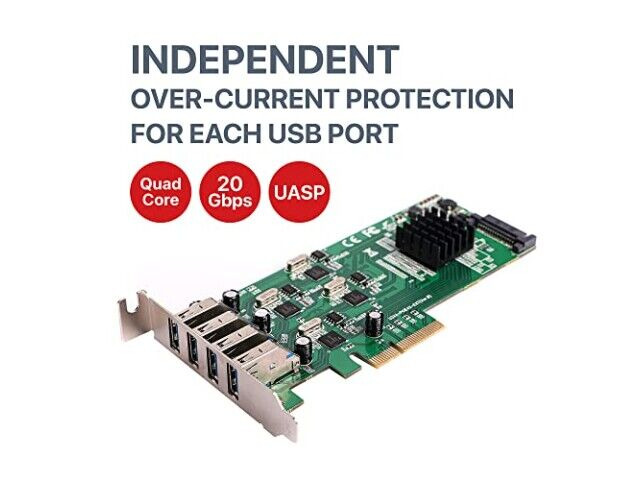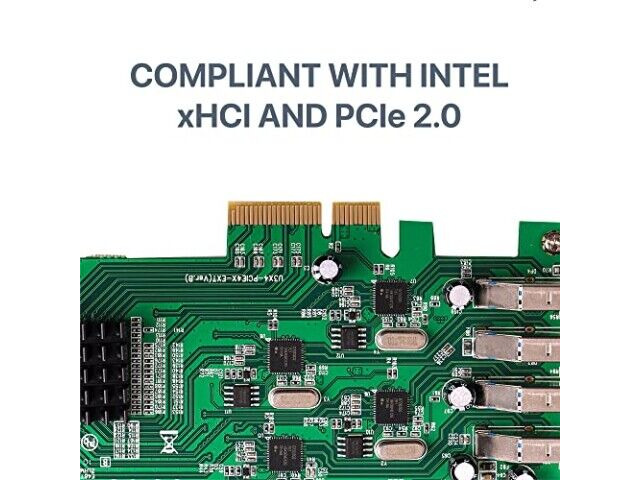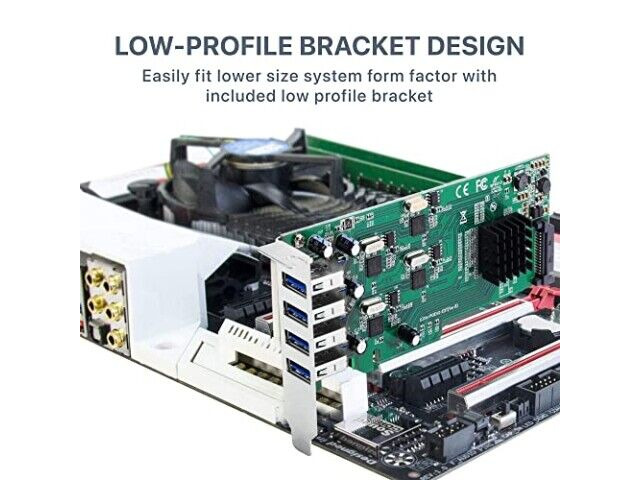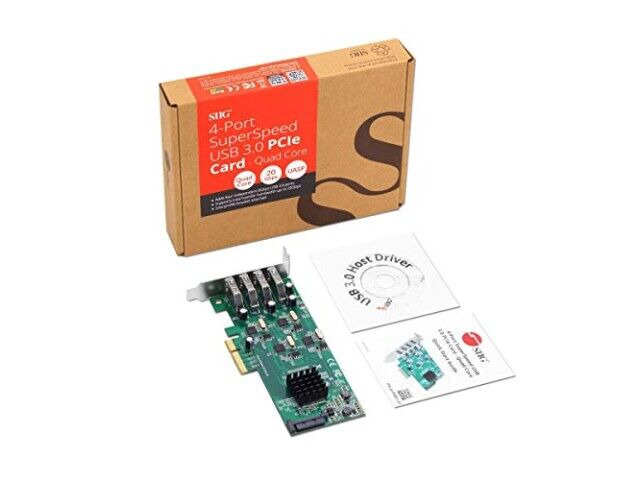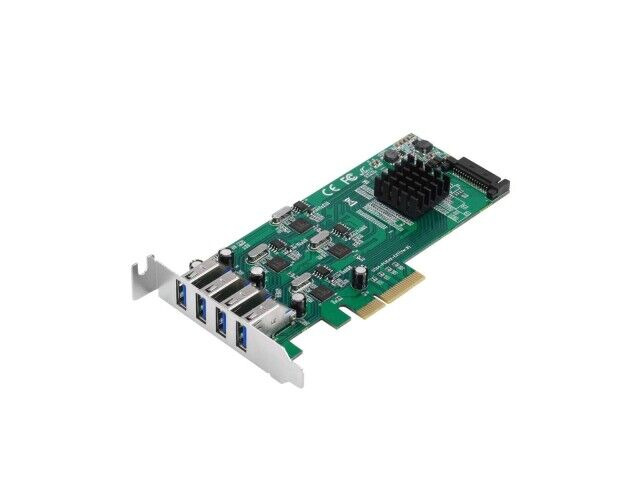Homepage / Electronics / Computers & Accessories / Computer Components / Internal Components / I/O Port Cards / Serial Port Cards
USB 3.0 PCIe Card - 4 Port 5Gbps Channels, Quad Core 20Gbps, UASP Support (JU-P40811-S1)
|
Prices shown may differ from Amazon due to dynamic updates, promotions, inventory changes, or item condition (new/used/refurbished).
The final price and availability are confirmed on Amazon at checkout.
Learn more.
|
|
|
|
|
|
As an Amazon Associate, we earn from qualifying purchases. Prices and availability change frequently;
the final terms are displayed on Amazon’s website at the time of purchase.
Pricing Policy.
|
|
| Brand: | SIIG |
This is a USB 3.0 PCIe card designed to expand the connectivity options of a computer by adding four high-speed USB 3.0 Type-A ports. It is ideal for users who need additional USB ports for peripherals such as external hard drives, flash drives, or other USB devices that require high-speed data transfer. The card is particularly useful for desktop computers with limited internal USB ports or those that need to support multiple high-speed devices simultaneously.
The card features four independent USB 3.0 ports, each capable of transferring data at up to 5Gbps, providing a total bandwidth of 20Gbps. This makes it suitable for transferring large files quickly, such as high-resolution videos or large datasets. It uses the Renesas uPD720202 chipset, known for its reliability and performance in USB 3.0 applications, ensuring stable and fast data transfers.
The card supports a wide range of USB speeds, including low-speed (1.5 Mbps), full-speed (12 Mbps), high-speed (480 Mbps), and super-speed (5 Gbps). It is compliant with the Intel xHCI specification and PCIe 2.0 standard, ensuring compatibility with a variety of motherboards and systems. The low-profile bracket design allows it to fit into smaller form factor systems, making it versatile for different computer builds.
The card includes independent over-current protection for each port, which helps safeguard connected devices and the card itself from power surges or spikes. This feature enhances the safety and longevity of both the card and the peripherals connected to it. It comes with a two-year warranty and email support from SIIG, providing users with peace of mind regarding product quality and after-sales service.
Brand: SIIG
Model: JU-P40811-S1
Specifications: 4 Port USB 3.0 PCIe Card, 4 Dedicated 5Gbps Channels, Quad Core 20Gbps, UASP Support, SATA Power
Features: Four Independent USB 3.0 Ports, Renesas uPD720202 Chipset, Low-Profile Bracket Design, Over-Current Protection Per Port, Compliant with xHCI and PCIe 2.0
The card features four independent USB 3.0 ports, each capable of transferring data at up to 5Gbps, providing a total bandwidth of 20Gbps. This makes it suitable for transferring large files quickly, such as high-resolution videos or large datasets. It uses the Renesas uPD720202 chipset, known for its reliability and performance in USB 3.0 applications, ensuring stable and fast data transfers.
The card supports a wide range of USB speeds, including low-speed (1.5 Mbps), full-speed (12 Mbps), high-speed (480 Mbps), and super-speed (5 Gbps). It is compliant with the Intel xHCI specification and PCIe 2.0 standard, ensuring compatibility with a variety of motherboards and systems. The low-profile bracket design allows it to fit into smaller form factor systems, making it versatile for different computer builds.
The card includes independent over-current protection for each port, which helps safeguard connected devices and the card itself from power surges or spikes. This feature enhances the safety and longevity of both the card and the peripherals connected to it. It comes with a two-year warranty and email support from SIIG, providing users with peace of mind regarding product quality and after-sales service.
Brand: SIIG
Model: JU-P40811-S1
Specifications: 4 Port USB 3.0 PCIe Card, 4 Dedicated 5Gbps Channels, Quad Core 20Gbps, UASP Support, SATA Power
Features: Four Independent USB 3.0 Ports, Renesas uPD720202 Chipset, Low-Profile Bracket Design, Over-Current Protection Per Port, Compliant with xHCI and PCIe 2.0
Customer Reviews (0)
write a review
(No reviews found. You may write the first one!)
(No reviews found. You may write the first one!)
